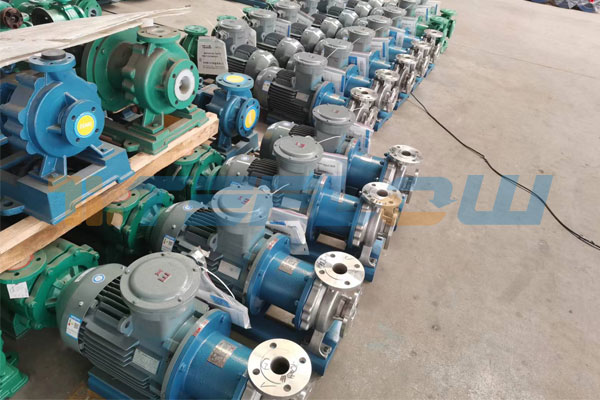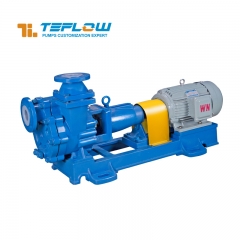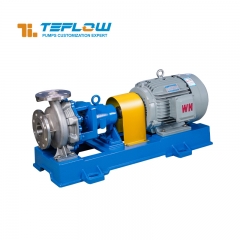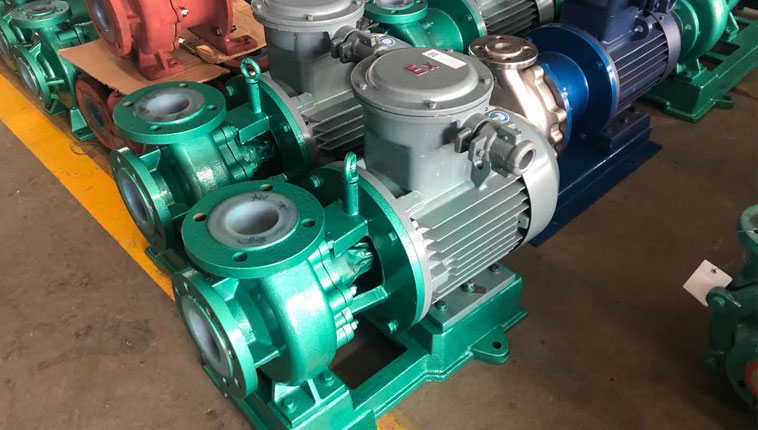Magnetic pumps, as common industrial pumps, are widely used in fields such as chemical, pharmaceutical, and food processing. When choosing a magnetic pump, it is crucial to consider the material composition and its impact on the pump's performance and suitability for the environment. This article compares the differences between fluoroplastic magnetic pumps and stainless steel magnetic pumps, including material characteristics, corrosion resistance, mechanical strength, and application scenarios, to help readers better understand the advantages and disadvantages of these two types of magnetic pumps.
I. Material Characteristics:
Fluoroplastic magnetic pumps primarily utilize materials such as polytetrafluoroethylene (PTFE) and other fluoropolymers, while stainless steel magnetic pumps are made of stainless steel. Fluoroplastics exhibit excellent corrosion resistance, wear resistance, and high-temperature stability, allowing them to operate for extended periods in harsh environments involving acids, alkalis, and organic solvents. On the other hand, stainless steel offers higher strength and hardness, enabling it to withstand higher working pressures and temperatures.
II. Corrosion Resistance:
Fluoroplastic magnetic pumps, due to their fluoropolymer materials, possess outstanding corrosion resistance. They can withstand the erosion of various strong acids and alkalis, such as sulfuric acid, hydrofluoric acid, and sodium hydroxide. This makes fluoroplastic magnetic pumps an ideal choice for handling corrosive media. In comparison, the corrosion resistance of stainless steel magnetic pumps is relatively weaker, and they may encounter corrosion issues when dealing with certain high-concentration acid or alkali media.
III. Mechanical Strength:
Stainless steel magnetic pumps, being composed of metallic materials, offer higher mechanical strength and rigidity, allowing them to withstand higher working pressures and impact loads. In contrast, fluoroplastic magnetic pumps have lower mechanical strength and are more sensitive to external forces and vibrations. Therefore, in high-pressure and heavy-duty working conditions, stainless steel magnetic pumps demonstrate greater reliability.
IV. Application Scenarios:
Due to their exceptional corrosion resistance, fluoroplastic magnetic pumps are particularly suitable for industries such as chemical and pharmaceutical, where they handle corrosive media during pumping operations. They can operate stably in harsh environments involving concentrated acids, alkalis, and other aggressive substances without contaminating the pumped medium. On the other hand, stainless steel magnetic pumps are more versatile and can be used in a broader range of applications. They can handle not only corrosive media but also general liquids. They perform well in situations with fewer instances of highly corrosive media.

There are notable differences between fluoroplastic magnetic pumps and stainless steel magnetic pumps regarding material characteristics, corrosion resistance, mechanical strength, and application scenarios. Fluoroplastic magnetic pumps are well-suited for handling corrosive media in specialized environments, offering outstanding corrosion resistance and high-temperature stability. Stainless steel magnetic pumps, on the other hand, are more suitable for general pumping requirements, exhibiting higher mechanical strength and broader applicability. When selecting the appropriate magnetic pump, it is essential to consider specific working conditions and media properties, ensuring the optimal choice to enhance productivity and ensure equipment reliability.





 +86 18130251359
+86 18130251359 teflowpumps@tlpumps.com
teflowpumps@tlpumps.com











 +86+0563-5093318
+86+0563-5093318
